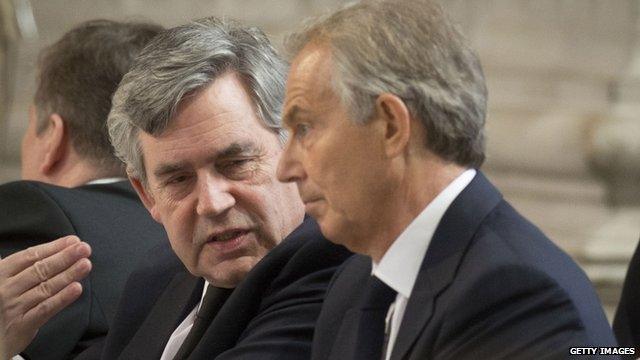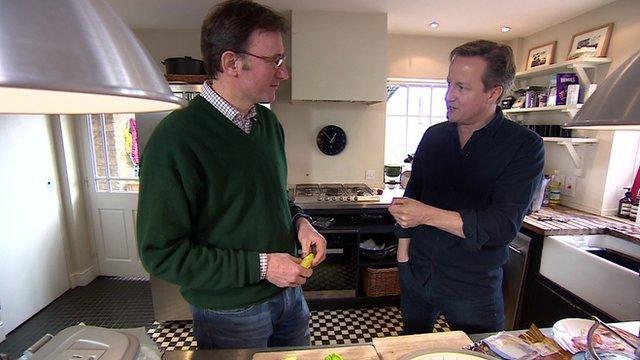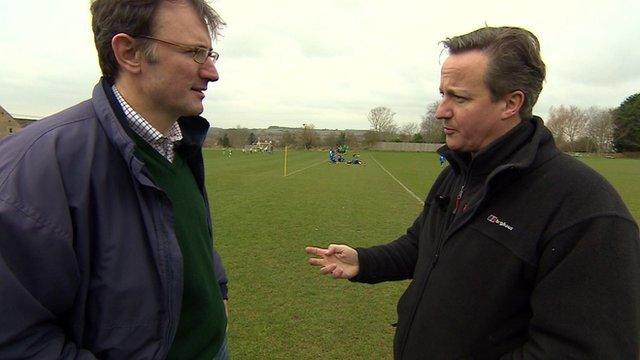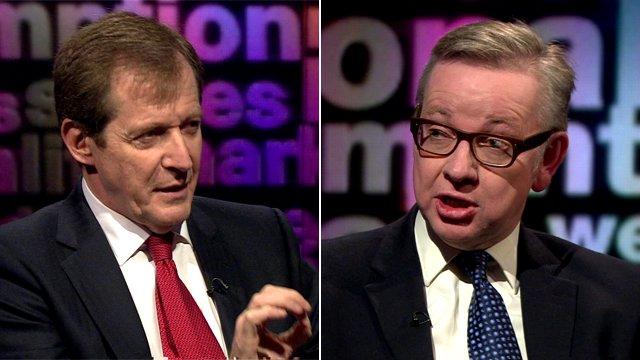Calling time, ahead of time
- Published
David Cameron told James Landale he would not be running for a third term
Why do they do it? Why do our leading politicians sometimes feel the need to emphasise their own political mortality? Why do they set a time limit upon their tenure?
Generally, it is designed to quieten murmurs of discontent within their own party's ranks. It is saying, in effect: "Look, I know you don't like me much. But, hey, I won't be around for ever."
Where did that "hey" come from? Perhaps a semi-conscious echo of Tony Blair who spent much of his Prime Ministerial career facing demands to depart, generally from the Kingdom of Fife or rather one denizen thereof.
Indeed, it is said that Mr Blair signalled the timetable for his departure even as he informed Gordon Brown that he would be standing for the Labour leadership in the first place. The terms, however, are disputed, even to this day.

When would Gordon Brown take over from Tony Blair was a question frequently asked
Eventually, after the 2005 election, Tony Blair announced that he would step down soon. Did that quieten the restless pretender? Did that end the fuss? Friends, it did not.
One must presume that David Cameron is motivated by a comparable factor. He is telling his occasionally restless party: stick with it, things will change.
There is a section of the Conservative Party which has never quite accepted David Cameron. They wonder whether he is truly a Tory, truly "one of us" - a phrase which, for Tories, carries decidedly conscious echoes of an earlier leader.
I mean, for goodness sake, he offered to hug hoodies - whom they would rather intern. He favoured same sex marriage. He lunged, from time to time, towards environmentalism. OK, so he swung back later but where did that initial instinct come from?
Plus he didn't win. He failed to gain an overall majority in an election when Labour recorded a notably poor share of the vote. Parties will forgive much if their leader is racking up the seats in the Commons.
Future focus
Yes, of course, there are new factors at play in UK politics today, not least the rise of UKIP. But, still, Tories in particular expect victory to be delivered. They are impatient with opposition and tend to dispense with leaders who generate such a situation.
And so Mr Cameron indicates that, if given the chance, he will serve a further full term at Westminster - but not beyond that. All clear? All settled? All questions done? All internal passion spent?
To the contrary. The second a leader is chosen, the contest begins for the succession. Initially subterranean, declarations like Mr Cameron's in a BBC interview with James Landale tend to increase the pace of such considerations, strengthen the focus upon the future.
Several things attend upon his words. Firstly, opposition parties say that he is presuming victory, that he is taking the voters for granted. I understand why they make that point: it suits a narrative.
Alastair Campbell says Mr Cameron's answer was a "disaster" but Michael Gove says he supports the PM's "honest reply"
However, it could be argued that Mr Cameron's statement reflects internal party weakness rather than presumed electoral strength.
His comments are designed to still any lingering disquiet and thus enhance the prospect of victory. That is, absolutely to the contrary of presuming that victory is already delivered.
Secondly, how is Mr Cameron's pledge to be delivered, if the voters give him the chance? At what point does he actually demit office? As Prime Minister. As leader of the Conservative Party.
If, as he says, he remains in office for the five years of the next Parliament, when does the contest for his successor take place? In the days before that election - with Mr Cameron still in office. Or in the days after a further election.
If before, how does a party divided by an election contest appeal to the voters? If after, how does Mr Cameron run an election campaign when voters know he is set to step down? If well before the election, how can he run for five years as PM?
There is a third factor. The instant a leader signals his eventual departure, however postponed, the focus shifts to the next generation. Mr Cameron has even offered a handy shortlist of potential successors to assist that consideration.
So one understands why they do it. One simply notes that experience and psychology suggest the outcome will be other than internal party contentment.
Perhaps David Cameron should have, instead, followed the approach of his legendary predecessor and declared that he would go "on and on". But, then, that did not turn out too well either.
- Published23 March 2015

- Published23 March 2015

- Published24 March 2015

- Published23 March 2015